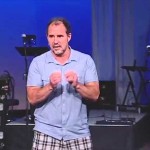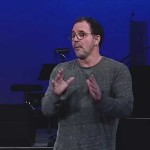We run our website the way we wished the whole internet worked: we provide high quality original content with no ads. We are funded solely by your direct support. Please consider supporting this project.

5 Ways the Bible Supports Open Theism
Open Theism refers to the belief that God created a world in which possibilities are real. It contrasts with Classical Theism which holds that all the facts of world history are eternally settled, either by God willing them so (as in Calvinism) or simply in God’s knowledge (as in Arminianism). Open Theists believe God created humans and angels with free will and that these agents are empowered to have “say so” in what comes to pass. In Open Theism, therefore, what people decide to do genuinely affects God and affects what comes to pass. In particular, by God’s own sovereign design, things really hang on whether or not God’s people pray.
The primary reason Open Theists believe what they do is because they find that Scripture presents the future as partly open. While there are certainly passages that depict God predetermining and foreknowing some aspects of the future, there are at least as many passages depicting God as facing a future partly comprised of possibilities. A small sampling of these sorts of passages are the following:
- The Lord frequently changes his mind in the light of changing circumstances, or as a result of prayer (Exod. 32:14; Num. 14:12–20; Deut. 9:13–14, 18–20, 25; 1 Sam. 2:27–36; 2 Kings 20:1–7; 1 Chron. 21:15; Jer. 26:19; Ezek. 20:5–22; Amos 7:1–6; Jonah 1:2; 3:2, 4–10). At other times he explicitly states that he will change his mind if circumstances change (Jer. 18:7–11; 26:2–3; Ezek. 33:13–15). This willingness to change is portrayed as one of God’s attributes of greatness (Joel 2:13–14; Jonah 4:2). If the future were exhaustively and eternally settled, as classical theism teaches, it would be impossible for God to genuinely change his mind about matters.
- God sometimes expresses regret and disappointment over how things turned out—even occasionally over things that resulted from his own will. (Gen. 6:5–6; 1 Sam. 15:10, 35; Ezek. 22:29–31). If the future was exhaustively and eternally settled, it would be impossible for God to genuinely regret how some of his own decisions turned out.
- At other times God tells us that he is surprised at how things turned out because he expected a different outcome (Isa. 5:3–7; Jer. 3:6-7; 19–20). If the future were eternally and exhaustively settled, everything would come to pass exactly as God eternally knew or determined it to be.
- The Lord frequently tests his people to find out whether they’ll remain faithful to him (Gen. 22:12; Exod. 16:4; Deut. 8:2; 13:1–3; Judges 2:20–3:5; 2 Chron. 32:31). If the future were eternally and exhaustively settled, God could not genuinely say he tests people “to know” whether they’ll be faithful or not.
- The Lord sometimes asks non-rhetorical questions about the future (Num. 14:11; Hos. 8:5) and speaks to people in terms of what may or may not happen (Exod. 3:18–4:9; 13:17; Jer. 38:17–18, 20–21, 23; Ezek. 12:1–3). If the future were exhaustively and eternally settled, God could never genuinely speak about the future in terms of what “may” or “may not” happen.
So the Bible presents God as interacting with a world that is moving into a partly open future. This doesn’t mean that God could ever be caught off guard or that his overall purposes for the world are ever threatened. Because they believe God is infinitely intelligent, Open Theists affirm that God anticipates each and every possibility from the foundation of the world, as though it were a certainty. Whatever comes to pass, God has a plan in place to respond to it, bringing good out of evil when this is necessary. But, unlike Classical Theists, Open Theists are confident that God is so smart, he can sovereignly rule the world effectively without needing to have everything pre-settled in his will or mind ahead of time.
__
art: “Trees by the Gein at Moonrise
by: Piet Mondrian
date: 1907 – 1908
Category: General
Tags: Arminianism, Bible, Calvinism, Free Will, Open Theism
Topics: Defending the Open View
Related Reading

What is the significance of 2 Samuel 24:17–25?
“So the Lord answered [David’s] supplication for the land, and the plague was averted from Israel.” The passage suggests that the Lord intended the plague to judge Israel further but David’s supplication persuaded him to change his mind and relent from his punishment. If the future is to some degree open and God is genuinely…

Sermon Clip: Twisted Scripture-Hebrews 9
Why must there be the shedding of blood for the forgiveness of sins? Our Twisted Scripture series continues this week as Greg explores Hebrews 9:18-22. This scripture passage is commonly used to support the penal substitutionary atonement theory in which our guilt was transferred to Christ and He was punished on the cross on our…

A Video Introduction to Open Theism
Here’s a video clip on Open Theism from Greg’s sessions with Travis Reed with The Work of the People. What is Open Theism? Open Theists affirm that God knows all of reality perfectly, so Open Theism really is about the nature and content of the future. Does the future contain real possibilities? We have to wrestle with…

A Review of a Review of Benefit of the Doubt
I’d like to offer a brief response to a curious on-line review of Benefit of the Doubt, published on thechristians.com. It’s titled, Which came first, Jesus or the Bible? A clever heretic draws a false division between God and Scripture. That “clever heretic” would be yours truly, and I allegedly draw this false division in…

In Darkest Times, God is Present
“However much evil was there, it would have been far worse if God was not there pushing back on it.” There is never a time when God is not present, no matter how bad the situation. In this short sermon clip, Greg Boyd talks about how we need to be watchful of the spirit world…

What is the significance of 1 Chronicles 21:15?
“And God sent an angel to Jerusalem to destroy it; but when he was about to destroy it, the Lord took note and relented concerning the calamity; he said to the destroying angel, ‘Enough! Stay your hand.’” This powerful passage tells us why God sent the angel and why he changed his mind. If God…
